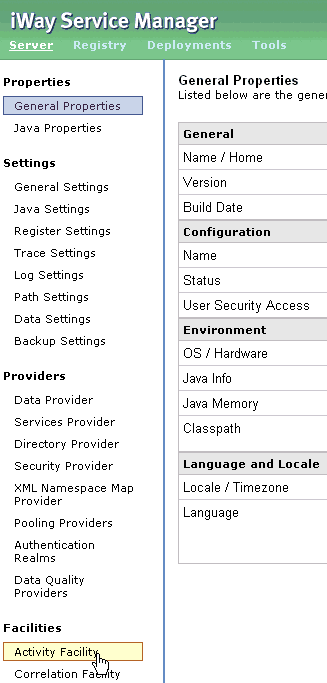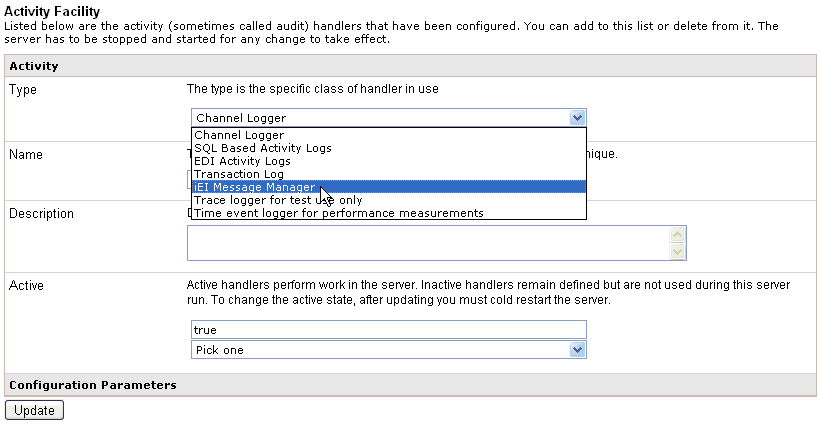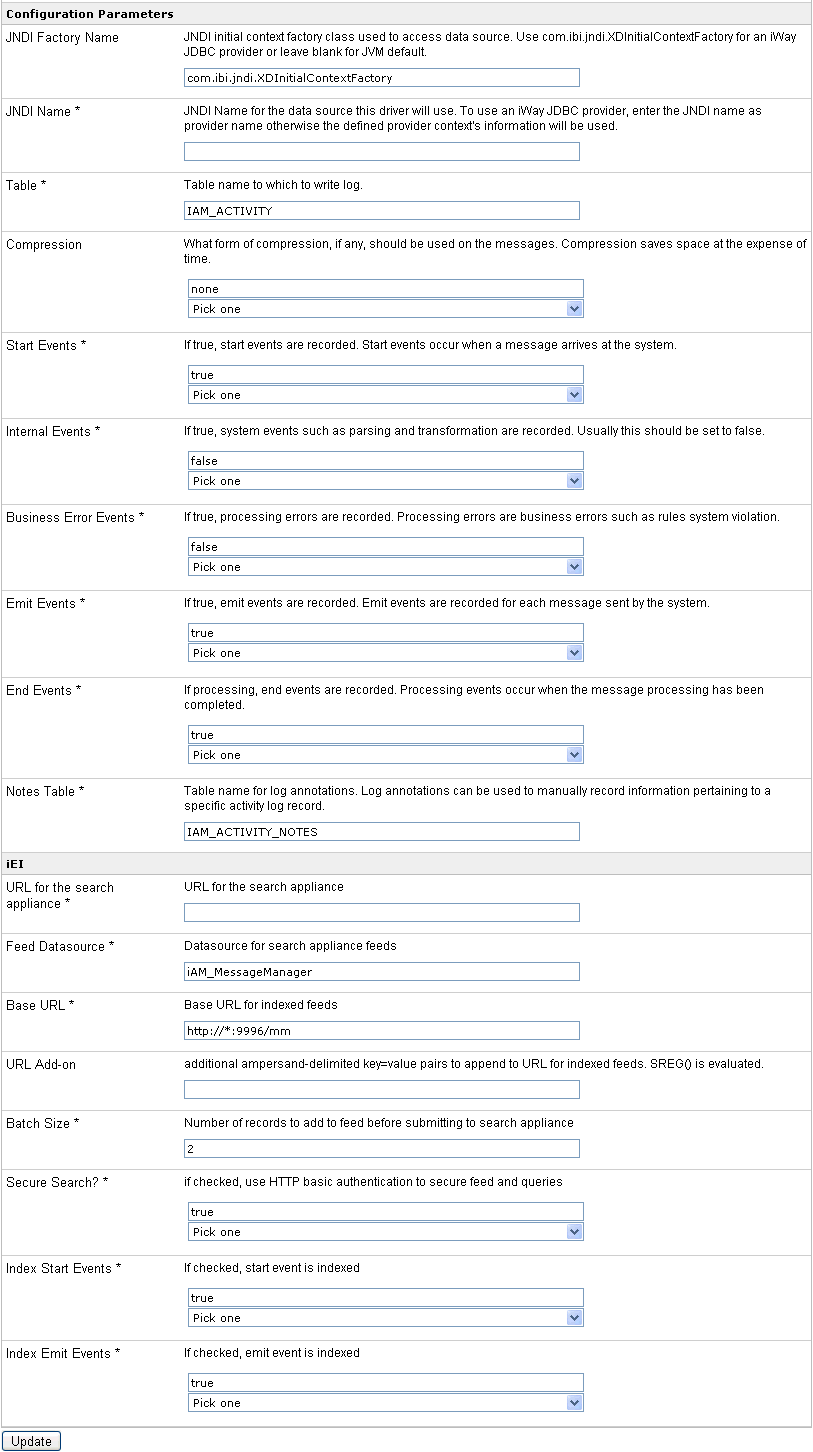To configure the Audited Message Indexing driver:
-
In the
iWay Service Manager Administration Console, select Server,
then select Activity Facility in the navigation
pane on the left.

The Activity Facility pane opens, as shown in the following image.

-
Click Add.
The following pane is displayed, as shown in the following image.

- From the Type drop-down list, select iEI Message Manager.
-
Click Next.
The configuration parameters are displayed, as shown in the following image.

-
Configure
the Audited Message Indexing driver parameters using the following
tables, which list and describe the parameters by driver properties
and search appliance properties.
Note: Before configuring the driver properties, create the databases to be used, and add the database drivers to the class path. Then, stop and restart iWay Service Manager.
Driver Properties:
Parameter Name
Type
Description
JNDI Factory Name
String
JDBC driver to use for connection to Message Repository, the database where the activity log and notes tables reside. Supported drivers include SQL Server, DB2, Sybase, Oracle, and others.
The following sample driver classes correspond to the string URLs listed as examples in the next section.
- For Microsoft SQL:
com.microsoft.jdbc.sqlserver. SQLServerDriver.
- For DB2:
COM.ibm.db2.jdbc.app.DB2Driver
- For Sybase:
com.sybase.jdbc.SybDriver
- For Oracle:
oracle.jdbc.driver.OracleDriver
- For MySQL:
com.mysql.jdbc.Driver
JNDI Name*
String
JNDI name for the data source this driver will use. To use an iWay JDBC provider, enter the JNDI name as the provider name, otherwise the defined provider information context will be used.
Table *
String
Table name for the activity log. Must be a valid identifier in SQL Server. If the table does not exist at startup, it will be created.
Compression
String
Indicates the type of compression to be used.
Start Events *
Boolean
If set to true, input messages will be recorded in the activity log. This parameter must be enabled to use activity reports in iSM.
Note: Start events are indexed by the search appliance.
Internal Events *
Boolean
If set to true, system events are included in the activity log. Usually not required. System events include activities such as parsing and transformations.
Note: Internal events are not indexed by the search appliance.
Business Error Events *
Boolean
If set to true, processing errors are recorded. Processing errors are business errors, such as a rules system violation.
Note: Business Error Events are not indexed by the search appliance.
Emit Events
Boolean
If set to true, output messages from reply-to and emit agents will be recorded. Required for use of the activity log reports in iSM.
Note: Emit events are indexed by the search appliance.
End Events
Boolean
If set to true, the end of message processing will be recorded in the activity log. Required for use of the activity log reports in iSM.
Note: End events are indexed by the search appliance.
Notes Table
String
The name of the table to be used for log annotations
Note: Parameters with an asterisk (*) are required.
iEI Properties:
Parameter
Value
Description
URL for the appliance *
http://server:port/directory
For example,
http://server1:19900/xmlfeed
URL of the search appliance feed service.
Feed Datasource *
hostname
For example, server1
This is used to clearly identify feeds from the source. This should be unique to this instance of the driver.
Base URL *
http://host:port/query string
For example,
http://*:9996/audit
URL that will be associated with documents fed to the search appliance. A query string will be appended to uniquely identify each document in the feed. The asterisk will be replaced by the name of the host where iSM is running. The URL used here is used again later in the configuration of the listener. You must supply a context following the host and port, for example, /audit.
URL Add-on
Source=SREG(source)
Optional. Extra values will be appended to the query string when a URL is created for a document that is sent to the search appliance. Runtime functions like SREG will be evaluated.
Batch Size *
2
For efficiency, multiple documents can accumulate before sending a feed to the search appliance. Incomplete batches that remain in the system can be sent based on the current activity level.
Secure Search? *
True
if checked, use HTTP basic authentication to secure feed and queries.
Index Start Events *
True
Indicates whether the listener input should be sent to the search appliance.
Index Emit Events *
True
Indicates whether the listener output should be sent to the search appliance.
Note: Parameters with an asterisk (*) are required.
- Save changes, the fully stop and restart iWay Service Manager.
Note: Some databases cannot use the built-in DDL statements and must be constructed manually as part of the installation steps. Attached to this document are DDL scripts for a variety of data bases. To view these files, click the paperclip icons at the beginning of this topic. You will need to rename the files so that they have a .sql extension in order to use the scripts.